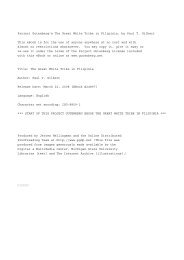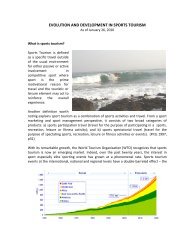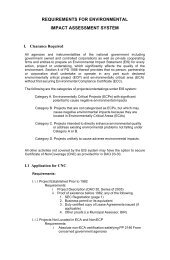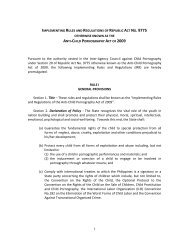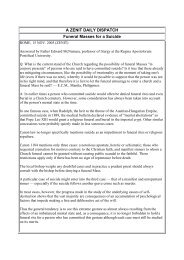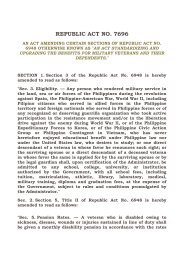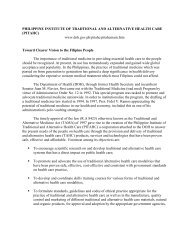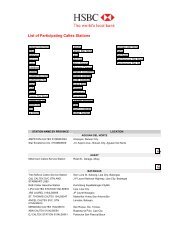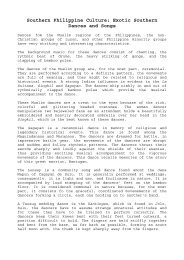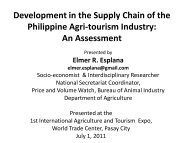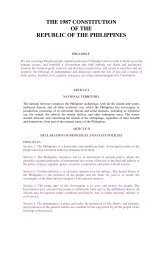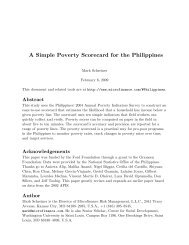Mining in the Philippines - Concerns and Conflicts
Mining in the Philippines - Concerns and Conflicts
Mining in the Philippines - Concerns and Conflicts
You also want an ePaper? Increase the reach of your titles
YUMPU automatically turns print PDFs into web optimized ePapers that Google loves.
1.3 Revoke <strong>the</strong> 1995 <strong>M<strong>in</strong><strong>in</strong>g</strong> Act. Among civil society groups we met <strong>the</strong>re were repeated calls for <strong>the</strong><br />
scrapp<strong>in</strong>g of <strong>the</strong> 1995 <strong>M<strong>in</strong><strong>in</strong>g</strong> Code. We suggest, given <strong>the</strong> division <strong>and</strong> conflict associated with it,<br />
that <strong>the</strong> government heeds <strong>the</strong> calls to revoke <strong>the</strong> <strong>M<strong>in</strong><strong>in</strong>g</strong> Act of 1995 <strong>and</strong> enact alternative legislation<br />
to regulate m<strong>in</strong><strong>in</strong>g, based on a participatory process that more effectively protects <strong>the</strong> <strong>in</strong>terests of <strong>the</strong><br />
affected local communities, <strong>in</strong>digenous peoples <strong>and</strong> <strong>the</strong> environment.<br />
1.4 <strong>M<strong>in</strong><strong>in</strong>g</strong> Review Body. We recommend that <strong>the</strong> government establishes a credible <strong>in</strong>dependent<br />
m<strong>in</strong><strong>in</strong>g review body <strong>and</strong> subject all recently granted m<strong>in</strong><strong>in</strong>g licenses under <strong>the</strong> 1995 <strong>M<strong>in</strong><strong>in</strong>g</strong> Code to a<br />
credible <strong>in</strong>dependent review, <strong>in</strong>volv<strong>in</strong>g civil society <strong>and</strong> affected communities <strong>in</strong> <strong>the</strong> process. This<br />
review body should have <strong>the</strong> power to recommend cancellation of m<strong>in</strong><strong>in</strong>g licenses where anomalies<br />
<strong>in</strong> process or breaches <strong>in</strong> st<strong>and</strong>ards are revealed.<br />
1.5 Independent technical advice. The processes, perta<strong>in</strong><strong>in</strong>g to m<strong>in</strong><strong>in</strong>g applications <strong>and</strong> subsequent<br />
operations, would benefit greatly if communities <strong>and</strong> <strong>in</strong>digenous peoples had access to an<br />
<strong>in</strong>dependent resource pool, drawn from academia <strong>and</strong> o<strong>the</strong>r sections of civil society, to provide<br />
<strong>in</strong>dependent technical <strong>and</strong> legal advice (<strong>and</strong> where necessary legal support) throughout <strong>the</strong> life of <strong>the</strong><br />
projects. This body could also provide <strong>in</strong>formation, expertise <strong>and</strong> capacity build<strong>in</strong>g to <strong>in</strong>digenous<br />
peoples dur<strong>in</strong>g <strong>the</strong> free, prior, <strong>in</strong>formed consent process. The EU <strong>and</strong> o<strong>the</strong>r <strong>in</strong>ternational donors<br />
could assist <strong>in</strong> establish<strong>in</strong>g <strong>and</strong> fund<strong>in</strong>g an <strong>in</strong>dependent body provid<strong>in</strong>g legal <strong>and</strong> scientific advice to<br />
<strong>in</strong>digenous peoples dur<strong>in</strong>g <strong>the</strong> FPIC <strong>and</strong> ESIA processes. The body could be composed of a<br />
comb<strong>in</strong>ation of <strong>in</strong>digenous peoples’ organizations, civil society organizations <strong>and</strong> academia. For<br />
example a centre for <strong>in</strong>digenous peoples’ rights could be established with<strong>in</strong> a respected Philipp<strong>in</strong>e<br />
University.<br />
1.6 Upgrad<strong>in</strong>g <strong>and</strong> restructur<strong>in</strong>g of government departments. In l<strong>in</strong>e with best <strong>in</strong>ternational practice<br />
<strong>and</strong> <strong>the</strong> recommendations of <strong>the</strong> EIR, we urge <strong>the</strong> government to consider <strong>the</strong> restructur<strong>in</strong>g of <strong>the</strong><br />
Department of Environment <strong>and</strong> Natural Resources (DENR). This should be done to elim<strong>in</strong>ate <strong>the</strong><br />
conflict of <strong>in</strong>terest <strong>in</strong> <strong>the</strong> DENR m<strong>and</strong>ate, by divorc<strong>in</strong>g <strong>the</strong> office for approval of exploration <strong>and</strong><br />
m<strong>in</strong><strong>in</strong>g applications from <strong>the</strong> office of environmental regulation, monitor<strong>in</strong>g <strong>and</strong> legal enforcement. 117<br />
The DENR could <strong>the</strong>n better focus on <strong>the</strong> protection <strong>and</strong> development of <strong>the</strong> Philipp<strong>in</strong>e environment<br />
<strong>and</strong> renewable natural resources; while a Department of M<strong>in</strong>es, Hydrocarbons <strong>and</strong> Geosciences could<br />
deal with licens<strong>in</strong>g of m<strong>in</strong><strong>in</strong>g <strong>and</strong> hydrocarbon development <strong>and</strong> ensure compliance with <strong>the</strong> highest<br />
<strong>in</strong>ternational technical st<strong>and</strong>ards. The government should also establish an office of m<strong>in</strong><strong>in</strong>g<br />
ombudsman where any concerns <strong>and</strong> compla<strong>in</strong>ts over process <strong>and</strong> where accusations <strong>in</strong> relation to<br />
human rights, aris<strong>in</strong>g from m<strong>in</strong><strong>in</strong>g activities, might be addressed.<br />
1.7 Streng<strong>the</strong>n legal frameworks for susta<strong>in</strong>able development. Government departments, <strong>in</strong>clud<strong>in</strong>g<br />
those cover<strong>in</strong>g health, agriculture <strong>and</strong> tourism should be empowered to take appropriate action<br />
where m<strong>in</strong><strong>in</strong>g or o<strong>the</strong>r projects, threaten or cause environmental or social damage affect<strong>in</strong>g <strong>the</strong><br />
national plans towards susta<strong>in</strong>able development. The government <strong>and</strong> <strong>in</strong>ternational partners should<br />
also ensure that <strong>the</strong> DENR, <strong>and</strong> o<strong>the</strong>rs responsible for enforc<strong>in</strong>g regulations <strong>and</strong> st<strong>and</strong>ards, are<br />
allocated a sufficient budget to effectively monitor <strong>and</strong> hold companies to account.<br />
1.8 Establish an <strong>in</strong>ter-departmental coord<strong>in</strong>at<strong>in</strong>g committee to approve all extractive <strong>in</strong>dustry<br />
projects <strong>and</strong> ensure that <strong>the</strong>y meet national <strong>and</strong> <strong>in</strong>ternational environmental <strong>and</strong> social st<strong>and</strong>ards for<br />
susta<strong>in</strong>able development, <strong>in</strong>clud<strong>in</strong>g full compliance with FPIC for <strong>in</strong>digenous people <strong>and</strong> broad<br />
community consent for all affected communities. To ensure transparency <strong>and</strong> accountability, we<br />
suggest that civil society participation at committee level would be essential.<br />
1.9 Local communities <strong>and</strong> civil society The right to enjoy human rights <strong>and</strong> development are<br />
universal. We wish to encourage any <strong>and</strong> all communities adversely affected by m<strong>in</strong><strong>in</strong>g impacts to<br />
24



